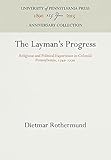The Layman's Progress : Religious and Political Experience in Colonial Pennsylvania, 1740-1770 / Dietmar Rothermund.
Material type: TextSeries: Anniversary CollectionPublisher: Philadelphia : University of Pennsylvania Press, [2016]Copyright date: ©1962Edition: Reprint 2016Description: 1 online resource (202 p.)Content type:
TextSeries: Anniversary CollectionPublisher: Philadelphia : University of Pennsylvania Press, [2016]Copyright date: ©1962Edition: Reprint 2016Description: 1 online resource (202 p.)Content type: - 9780812273472
- 9781512806250
- online - DeGruyter
- Issued also in print.
| Item type | Current library | Call number | URL | Status | Notes | Barcode | |
|---|---|---|---|---|---|---|---|
 eBook
eBook
|
Biblioteca "Angelicum" Pont. Univ. S.Tommaso d'Aquino Nuvola online | online - DeGruyter (Browse shelf(Opens below)) | Online access | Not for loan (Accesso limitato) | Accesso per gli utenti autorizzati / Access for authorized users | (dgr)9781512806250 |
Browsing Biblioteca "Angelicum" Pont. Univ. S.Tommaso d'Aquino shelves, Shelving location: Nuvola online Close shelf browser (Hides shelf browser)

|

|

|

|

|

|

|
||
| online - DeGruyter J. Russell Smith : Geographer, Educator, and Conservationist / | online - DeGruyter Tamerlane, a Tragedy / | online - DeGruyter Collective Bargaining : Survival in the '70s? / | online - DeGruyter The Layman's Progress : Religious and Political Experience in Colonial Pennsylvania, 1740-1770 / | online - DeGruyter Ernst Kurth as Theorist and Analyst / | online - DeGruyter Taxpayer Compliance, Volume 1 : An Agenda for Research / | online - DeGruyter Taxpayer Compliance, Volume 2 : Social Science Perspectives / |
Frontmatter -- Contents -- Preface -- Introduction -- I. Philadelphia and the World -- II. The Implications of the Great Awakening -- III. The New Denominational Consciousness -- IV. The Process of Secularization -- V. Pennsylvania's Political Problems -- VI. Patterns of Leadership -- VII. The Interaction of Groups -- VIII. The Eve of the Revolution -- Conclusions -- Appendix -- Bibliography -- Index
restricted access online access with authorization star
http://purl.org/coar/access_right/c_16ec
The religious and political activities in Pennsylvania during the period between the Great Awakening and the eve of the Revolution (1740-1770) were at once typical and unique: typical as far as he general trend of American experience is concerned, unique, however, with regard to the participants and many of the issues at stake.This volume provides a balanced picture of these activities and, more specifically, describes and interprets three interrelated trends that obtained during this period-the transformation of diverse groups into a public, the shift from religious to secular interests, and the sequence of revivalistic fervor and denominational consolidation. These trends are considered with respect to the long-term developments of history, as well as with regard to their short-term interaction in the particular situation of Colonial Pennsylvania. The pattern of the interaction of these trends is delineated in detail with a view to examining the practical evolution of American Democracy and the roots of a distinct American civilization.It is noteworthy that The Layman's Progress attempts to introduce a new point of view into American Colonial historiography by focusing on contemporary attitudes rather than interpreting the period from the viewpoint of subsequent events. To this end the author has utilized a great deal of unpublished source material, some of which now appears for the first time in the Appendix. In addition, an effort has been made to emphasize those aspects of colonial history that have heretofore been largely neglected. Thus, the author gives special consideration to the interaction of the various ethnic and religious groups; more attention is devoted to religious affairs than to political, and the German groups are examined in closer detail than are the English groups.Thoroughly documented, clearly and imaginatively written, The Layman's Progress is a significant contribution to American Colonial historiography.
Issued also in print.
Mode of access: Internet via World Wide Web.
In English.
Description based on online resource; title from PDF title page (publisher's Web site, viewed 27. Sep 2021)


